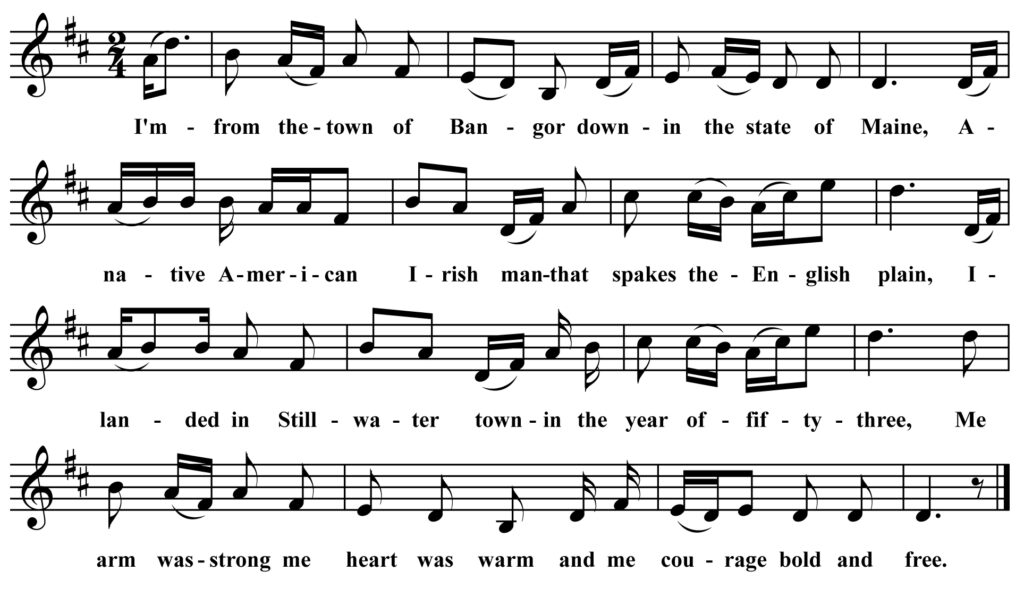Mickey Free

I’m from the town of Bangor
Down in the state of Maine,
A native American Irishman,
That spakes the English plain;
I landed in Stillwater town
In the year of fifty-three,
Me arm was strong, me heart was warm,
And me courage bould and free.
It’s on the Boom I sarved me time—
Wid corporation fare,
Plenty to eat sich as it was,
And something I had to wear;
And I’ve worked the Namekagon
In ould Schulenburg’s employ,
And on the Clam and Yellow rivers
For the valiant Bob Malloy.
And I’ve camped among the wigwams,
On Totogatic’s shore,
Where I held me own with Whalen,
Jim Crotty and George Moore;
And I worked wid Pease and Jackman
In the year of seventy-four,
And when ould Dan, he shelled the Pease,
I heard the cannons roar.
And on the Namekagon drive
With Tom Mackey I have been,
Where I fought the great Tom Haggerty—
While Bill Hanson stood between;
And I fought with big John Mealey—
And might have won the day,
If bould Jake Resser had been there
And seen I had fair play.
And I’ve been at stoppin’ places,
When travellin’ on my way,
Where gray backs big as June bugs
Were thick as flowers in May;
And I’ve been with ould man Greeley
Upon the St. Croix drive;
Where misketeys big as hummin’ birds—
Used to ate the min alive.
And I might have been a partner
With Ike Staples in the mill,
Or at least a boss for Louie
Or ould New Brunswick Bill;
But I’m always weak with wimmin—
Let them be wives or maids,
They may be fair and pretty
Or black as the ace of spades.
And they’ve broke me heart entirely—
Nary a cint’s forninst me name,
I may work for Dunn or Crotty
It’s always just the same,
But I’m thinkin’ to turn farmer
And forget me early days,
Take “homestead” up in Bashaw
Where I’m sure to mend me ways.
This song tells the story of St. Croix Valley timber cruiser Ed Hart (~1830-1900). Born in Windsor, Nova Scotia, Hart moved to Bangor, Maine as a young man before continuing to Stillwater, Minnesota where he became a cruiser (someone who surveyed timberlands for lumber companies). The song was written by William Young, a US government agent sent to the St. Croix in the 1870s to investigate illegal logging. Young befriended Hart, who took him along on his timber cruising trips where they traveled 30 miles a day on snowshoes and slept out under the stars in the middle of winter. Young was so impressed by his rugged friend that he composed this ballad based on Hart’s life.
The text above is taken word-for-word from James Taylor Dunn’s book The St. Croix: Midwest Border River complete with its many “Irish-American dialect” words (ould, misketeys, etc.) It is unclear what Dunn’s source was for the song though he says it “made its first known appearance at Taylors Falls early in 1878 and was widely repeated up and down the valley.” I also found proof of the song entering the oral tradition in the St. Croix. In an interview at the Minnesota Historical Society, Maggie Orr-O’Neill, whose father owned camps on the Wisconsin side of the Valley, remembered hearing local “red shirts” (river drivers) sing the verse about “mosquitoes big as hummingbirds.”
I sang a version of this song for my Minnesota Lumberjack Songs album where I skipped verse four and changed the end of verse six. (I sing: “The fair ones and the cruel ones with hearts as black as spades.”) The crass racial undertones at the end of verse six as printed by Dunn could have stemmed from songwriter Young’s discomfort with Ed Hart’s Ojibwe wife Me-dwe-a-shi-kwe. Hart and Me-dwe-a-shi-kwe married in 1871 and, as the last verse says, homesteaded in Bashaw, Wisconsin where they raised a family.
The Namekagan, Clam, Yellow and Totogatic are all rivers and streams in northwestern Wisconsin. Schulenburg, Bob Malloy, old man Greeley (Elam Greeley), Ike Staples (Isaac Staples), Louie (Louis Torinus) and New Brunswick Bill (William Chalmers) were a sort of who’s who of the mid-1800s logging industry in the St. Croix. “Dan he shelled the Pease” is a pun on a violent dispute between Dan E. Smith and the Pease and Jackman logging company in 1874. Graybacks are bedbugs.
I have been unable to find the original melody for this song and I have tried a few different options over the years. Above, I have married the text to a melody used by Newfoundland singer Mike Molloy for a popular north woods song called “My Good-Looking Man.”
